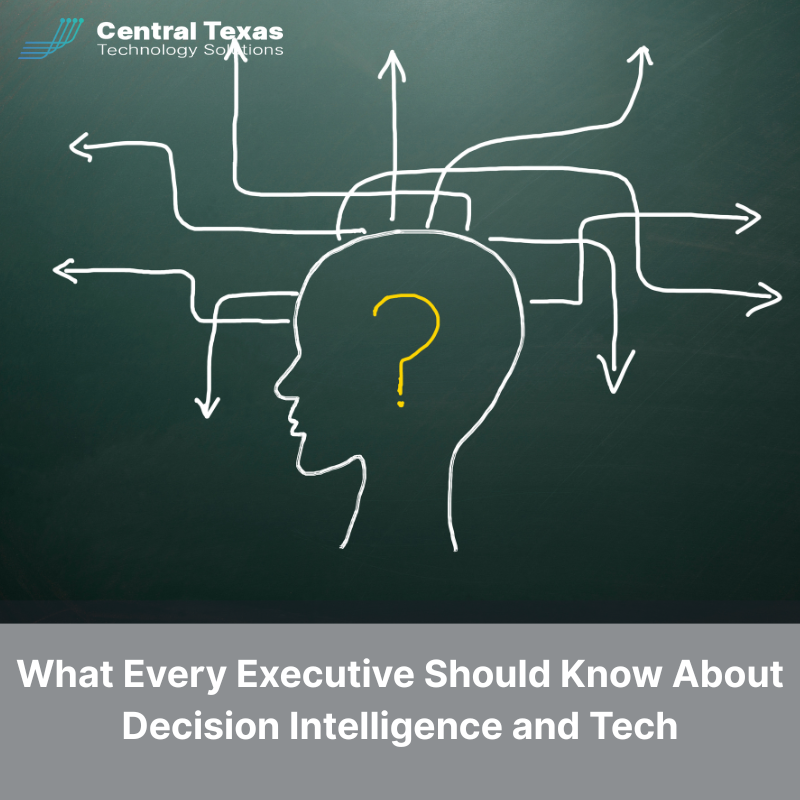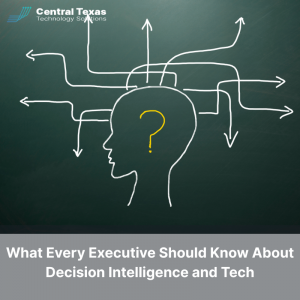
 In business, the decisions you make today shape your success tomorrow. But too often, leaders are forced to make big calls based on gut instinct, incomplete data, or outdated reports. What if you could rely on something smarter? Something that not only tells you what happened, but also what’s likely to happen next, and how to prepare for it?
In business, the decisions you make today shape your success tomorrow. But too often, leaders are forced to make big calls based on gut instinct, incomplete data, or outdated reports. What if you could rely on something smarter? Something that not only tells you what happened, but also what’s likely to happen next, and how to prepare for it?
Welcome to the age of Decision Intelligence.
This emerging field combines artificial intelligence, data analytics, and behavioral science to help leaders make faster, more accurate, and more strategic decisions. It’s not just a buzzword—it’s a game-changer for executives who want to lead with clarity and confidence.
Understanding Decision Intelligence
Think of decision intelligence as your strategic co-pilot. It doesn’t replace human judgment, but it enhances it. These platforms digest massive amounts of data, detect patterns, and offer predictive insights that help guide your next move. Unlike traditional business intelligence, which looks backward at what happened, decision intelligence looks forward.
Here’s what sets it apart:
- Predictive Power: It simulates different outcomes so you can evaluate your options before taking action.
- Contextual Awareness: It blends raw data with behavioral science to offer more holistic, human-centered insights.
- Faster Execution: Real-time analysis means quicker pivots and more informed decisions—right when you need them.
Why Decision Intelligence Is Transforming Project Management
For many leaders, project management is where chaos meets complexity. Budgets shift. Deadlines loom. Teams face changing priorities. Decision intelligence brings structure and foresight to what often feels like organized chaos.
Here’s how it’s changing the game:
Real-Time Data, Real-Time Decisions
You no longer have to wait until the end of a project to see what went wrong. With decision intelligence, real-time dashboards keep you updated on progress, productivity, spending, and more, so you can course-correct before problems spiral.
AI Insights That Support Confident Leadership
These systems identify risks before they become threats. They recommend adjustments, reveal hidden opportunities, and help you guide projects with the kind of foresight that builds trust and credibility across your team.
Ethical, Aligned, and Accountable
Smart decisions aren't just fast—they’re fair. With decision intelligence, you can bake ethical considerations and compliance checks into your decision-making process. This keeps your actions aligned with both corporate values and regulatory standards.
Proactive Is the New Competitive Advantage
Imagine seeing the bottlenecks before they form. Predicting when your team will be overextended. Or knowing which path will yield the best outcome based on past performance. That’s the proactive power of decision intelligence—and it’s becoming essential for staying ahead.
Real-World Use Across Industries
Decision intelligence isn’t just for tech companies or data-heavy businesses. It’s reshaping operations in every industry:
- Healthcare: Predict patient outcomes and allocate resources more efficiently.
- Finance: Spot trends in real time and make smarter investment decisions.
- Manufacturing: Minimize supply chain risks and optimize production cycles.
- Retail: Personalize customer experiences and forecast inventory with precision.
In every case, the outcome is the same: faster, smarter, and more impactful decisions.
Final Thoughts
The smartest leaders aren’t waiting for perfect information—they’re using decision intelligence to stay ahead of the curve. Whether you're managing projects, leading teams, or shaping long-term strategy, the ability to make proactive, data-informed decisions can be your greatest competitive advantage.
Now is the time to embrace the tech that helps you think clearly, move faster, and lead better.
Frequently Asked Questions
1. Is decision intelligence only for large enterprises?
Not at all. While enterprise businesses were early adopters, scalable decision intelligence tools are now available for mid-size and even small businesses that want to improve operations and reduce risk.
2. How is decision intelligence different from traditional business intelligence?
Business intelligence typically analyzes past data to understand what happened. Decision intelligence goes a step further by using AI to predict future outcomes and recommend actions.
3. Do I need a data science team to use decision intelligence?
No. Many platforms are designed to be user-friendly and integrate with your existing systems. With the right partner, you can implement decision intelligence without needing a full-time data science team.
Want to lead with clarity and confidence? Let’s talk about how decision intelligence can transform the way you manage projects and grow your business. Contact CTTS today for IT support and managed services in Austin, TX. Let us handle your IT so you can focus on growing your business. Visit CTTSonline.com or call us at (512) 388-5559 to get started!
